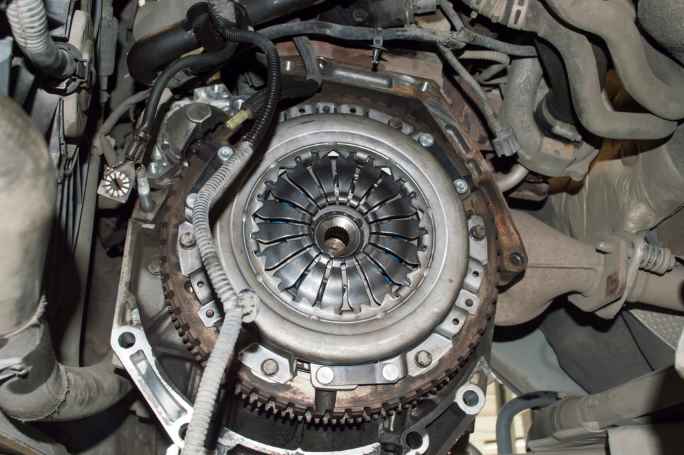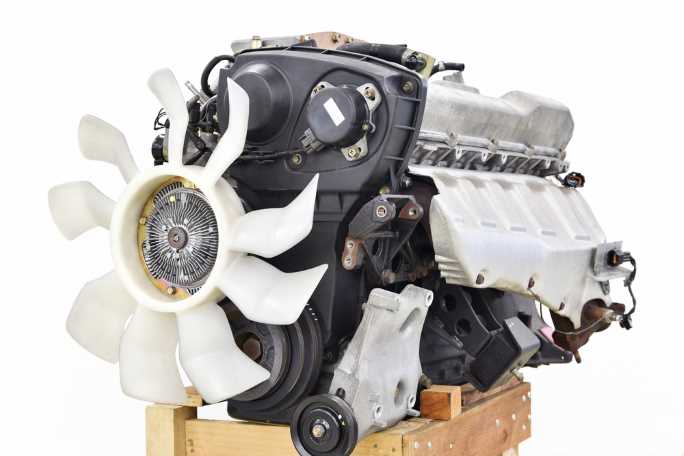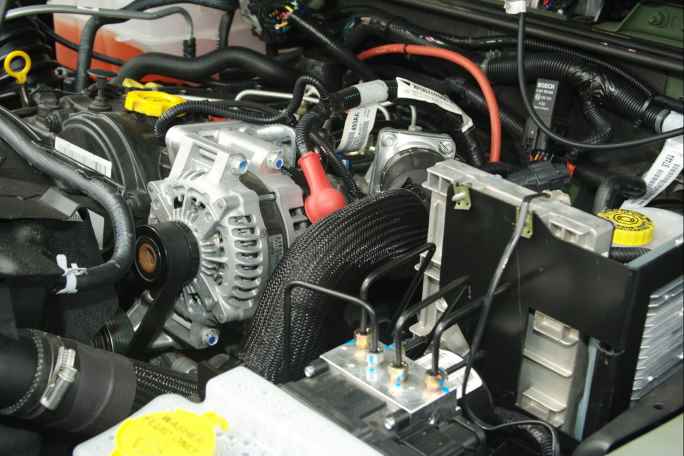You may be wondering, Will a bad or worn fan clutch cause AC problems?
Well, today, we will provide a detailed answer to that and every other question you may have about your vehicle’s fan clutch.
Car and truck owners have ignored fan clutches much to their detriment and we have seen this countless times.
So, if you are tired of your faulty cooling system damaging other areas of your vehicle, keep on reading-
03 Types of Clutch Fans
01. Thermal
The thermal clutch fan contains a bi-metal thermal spring that contracts and expands according to the heat that passes through the radiator.
The non-thermal clutch fan is the economical replacement for the more efficient thermal fan clutch, engaging and turning at 30-60% water pump sheet compared to the 70-90% of thermal clutch fan.
Compared to the thermal clutch fan, the non-thermal clutch fan is cheaper but requires more power for operation and is not as long-lasting.
02. Electronic Fan Clutch
This type of clutch fan is similar to the thermal design but its function is not dependent on the values of temperature or speed.
It instead runs on an ECM (Engine Control Module) or any other fan control module which utilizes several sensors that help determine when the fan clutch should be engaged.
The factors that affect its engagement include; air conditioning compressor engagement, engine idle, engine temperature threshold, and vehicle speed.
03. Torque-Limiting Fan Clutch
The torque fan clutch reacts exclusively to the engine speed.
During operation, a centrifugal valve is opened to allow the easy flow of heavy silicone fluid which then attaches the fan blades to the pulley.
When functioning at low and idle speeds, the fan clutch which is fully engaged slowly disengages proportionally to the increase of vehicular speed.
Although it depends on the application, it could freewheel between 2,500 and 3,000 rpm.
Will a Bad Fan Clutch Cause AC Problems?

Fan clutches operate in the part of the cooling system that is close to where the radiator is situated.
So, when the fan clutch is faulty or malfunctioning, it has a direct effect on the ability of your vehicle’s A/C to function properly.
This is because the compressors require appropriate airflow to re-cool the refrigerants to ensure that the engine performs at optimal levels.
When the fan clutch is not functioning at an efficient level, its decreased silicon levels, and faulty thermostatic spring lead to the radiator cooling fan performing well below efficient standards.
The air does not pass through the compressors accurately, thus, causing the A/C not to function properly.
This is why you should always check for temperature or leakage in the engine you hear or notice sometimes problematic, as this may help you avoid potentially hazardous situations.
The fan clutch serves as a medium for heat exchange in an air-cooling system, so a faulty one can cause considerable damage.
As it is designed to keep the condenser coil, a malfunction can lead to several complications producing a burning smell, lukewarm air, and causing the engine to overheat when idle.
Checking Method of the Fan Clutch for Faults
Wiggle the Fan
You can attempt to find out how driven a fan is to its fixture by moving the fan forward and backward.
During this process, you should listen to the sound that it produces, if you hear a click or notice a considerable wobble, this may be an indicator of a bearing that has been worn out.
Check the Fan Speed
When the clutch fan is engaged, it can be easily heard as it comes out with a gush of air.
During the increase in engine temperature, a torque-limiting fan clutch will disengage at varying engine speeds, while a thermal clutch fan engages at a determined temperature.
If your type of clutch fan does not follow its design instruction then it may be faulty and require replacement.
Inspect for Leakage

The heavy silicone fluid that is contained in a cooling system is the key to proper clutch fan functionality.
Due to the semi-fluid properties of silicon oil, there is a soft engagement that is used to drive your clutch fan.
So, if you notice a leakage then there will be a weakened functionality and if left unattended, the fan will eventually fail.
Spin the Fan
Although electrical fans are designed with a freewheel attachment, most clutch fans spin with minimal effort.
So, if your fan spins three or more times after manually spinning, then there is a huge chance that you have a bad clutch fan.
Also, if you notice that the fan does not spin at all when prodded, then your bearing may be seized.
Scan Tool
Electronic fan clutches require some basic knowledge of a scan tool for a diagnostic, along with sensors it is used to determine the level of fan engagement.
With this scan tool, you can accurately diagnose and repair your fan clutch in little to no time.
Signs of a Worn Fan Clutch
- If its vibration increases with the engine speed
- If the fan turns in a rough manner or not at all
- When the fan blade tip moves over ¼ inch from front to back
- There is poor A/C performance when the vehicle is idle or at low speeds
- If the fan spins too much when the engine is stopped
- When the fan speed is excessive at all speeds due to failed bearing
- The fan speed does not go up when the engine temperature increases
- When there is a leakage of fluid or oil build-up around the thermal spring/bearing
- Fan speed does not increase until the engine is extremely hot
Bad Clutch Fan Symptoms
As the most vital component of the fan cooling system, its proper function is critical to the operation of your engine and ensures that you maintain a safe temperature range.
Luckily, however, there are several ways to notice if a clutch fan is starting to develop faults or malfunction.
Being privy to these symptoms can alert the driver of a developing situation before any considerable damage is incurred by the engine during operation.
Since a bad or poorly functioning clutch fan can also lead to expensive repairs, paying attention to these four indicators could be money-saving.
Overheating of the Vehicle
When a fan clutch begins to fail, one of the first indicators or symptoms is an overheating engine.
This is an extremely easy problem to spot as most drivers quickly notice when their engine is emitting too much heat, but most do not attribute it to a failing fan clutch.
Because the fan clutch controls the cooling fan, any failure to function will stop the overall operation of the cooling fan.
When the cooling fan is not functioning, the heat from the vehicle’s engine becomes excessive and easily noticeable.
This either disable the fans or inhibits their ability to function properly and work at maximum efficiency, leading to furthermore severe problems.
Transmission Problems
When your clutch fan is faulty, there is a considerable decrease in machine performance leaving the fan permanently engaged.
When your fan clutch is stuck, it could lead to a drop in power and acceleration, and also hurts the fuel efficiency of the vehicle.
It finds it hard to switch gears and adjust to the increased level of cooling required by the vehicle’s engine during operation.
This leads to a downgrade in overall effectiveness and a slowing down of operations as the cooling fan cannot keep up with the required level of performance.
Unusually Loud Cooling Fans
Hearing loud cooling fans is a usual occurrence in vehicles but most operators do not attribute this problem to a bad or failing clutch fan.
When the fan clutch is stuck in an engaged position it leads to an unnecessary full engagement even when the function is not suitable.
This usually leads to an increase in the sound the engine generates during operation when the fan is blowing at full speed.
When you notice that your engine is suddenly louder, it is will be wise to check on the fan’s function and ensure it is not the cause.
Unstable and Loosely Fitting Fan
When a clutch fan begins to develop faults, the fittings become shaky and loose causing an unstable cooling system which may cause additional damage.
You can usually hear this wobbling and loose fitting when driving, especially at high speeds such as when on the expressway or highway.
To find out if a loosely fitting clutch fan is the cause of any unusual noise, turn on the engine while keeping the vehicle parked, pop the hood, and see if it stays in place while spinning.
An alternative way of checking to see if the fan is loose is to inspect the clutch hub for oil spillage, if there is, you may need to replace your clutch fan.
FAQs-
What is a Clutch Fan?
Any machine that has an engine as its component is bound to generate a considerable amount of heat.
This heat needs to be counteracted with a cooling system to ensure that the equipment continues to function properly.
A fan clutch is an essential part of the operation of cooling fans and the engine’s overall operation in vehicles that do not make use of electric cooling fans.
It is a thermostatic device that bases its operation on general temperature.
It is usually mounted on the fan, water pump, or any other belt-driven pulley and is available via two operations namely: thermal and non-thermal.
Can a bad fan clutch cause rough idle?
Yes. When your clutch fan is bad, it also affects the engine even when idle as the A/C usually does not perform optimally with a faulty fan clutch.
Will a bad fan cause no heat?
When you are in transit, the air then pushes air out via the radiator which in turn cools the engine without help from the clutch fan.
However, when the vehicle is in park mode, because the fan clutch is engaged, the air is not forced out through the radiator, leading to excess heat in the engine.
Can a bad fan clutch cause overheating?
Yes. The fan clutch is one of the most important components of the cooling fan.
This means that if it is not functioning properly, the overall cooling system of the vehicle malfunctions.
Since a bad fan clutch means warm air is not dissipated, there is a risk of the engine overheating.
Can a bad fan clutch cause a transmission problem?
Yes. The clutch fan is responsible for the effective functioning of the entire cooling system of your vehicle.
This means that a bad fan clutch will lead to further problems in every part of the vehicle including transmission, due to the engine not performing at optimal levels.
What does a fan clutch do?
The fan clutch is in charge of regulating the speed of the cooling fan in your vehicle.
It spins loosely to a certain temperature in the engine, engages, and then simultaneously lets the fan perform at its best.
It lets the cooling fan adapt when the engine is at low temperature and when it is at its hottest.
What does a bad fan clutch sound like?
When a fan clutch is faulty, it becomes excessively noisy and can never seem to work noiselessly even when not at full throttle.
When the fan clutch is easily audible when the engine is cold and hot, then it may be faulty and require replacement.
How long does a fan clutch last?
A fan clutch can last for several months and even years if well maintained.
The average fan clutch should last a year or two if taken care of and then should be replaced after that to avoid extra damage expenses.
When should I replace my fan clutch?
When your fan speed does not increase as the engine increases temperature it needs changing.
Also, if it spins excessively when the engine stops or there is poor A/C performance at idle vehicle speeds, then it requires replacement.
Final Words
The fan clutch is an especially important part of your vehicle’s cooling system.
Most users do not know this but it is usually a reason for several other malfunctions in your vehicle.
This is why you should always take some time to maintain and inspect its bearing and fittings to ensure it’s all functional.

